[Click on BLUE links for sources and information]
How do you know but ev’ry Bird that cuts the airy way, Is an immense world of delight, clos’d by your senses five? William Blake, The Marriage of Heaven and Hell
One Mendocino morning I woke up to the melodious, flutelike song of a meadowlark. To be honest, I was mostly awake, in that dreamy state between wakefulness and sleep, in the middle of what the physicists call a phase change such as when ordinary water turns to ice or begins to boil. Such a time is the cauldron in which creativity brews. “It is a process mostly unconscious, the product of which — the creative breakthrough we call originality — cannot be willed. It arrives unbidden, with an abruptness that often startles the very mind to which it alights.”
Think in the Morning is not some snappy kind of slogan. It’s something I and some others, actually do. Not all, of course. We are all different. The morning is my most creative time although any original thought of which I am capable is probably “the culmination of a successful train of association, which may have lasted for an appreciable time, and which has probably been preceded by a series of tentative and unsuccessful trains.”
And so, the low bell-like pluk or chuup of the meadowlark woke me from my stupor. Other morning birds joined in—wrens, towhees, woodpeckers—until all the “associations” fluttering inside my dazzled brain created a remarkable symphony of thoughts.
Now, the night before I had attended a talk by Peter Wells on his new book, Notes From the West Pole: Creating an Harmonious Life in an Adversarial Culture. His words and some of what I’d read in the book were still fresh in my mind. And then there was How to Do Nothing: Resisting the Attention Economy by Jenny Odell, a book that has received lots of press. The two books sat mutely on separate couches around a coffee table inside my brain while the meadowlark vied for my attention. Suddenly those “tentative and unsuccessful trains” of association raced by leaving me alone on the tracks, fully awake, excited and confused. This time the excitement won out over the confusion.
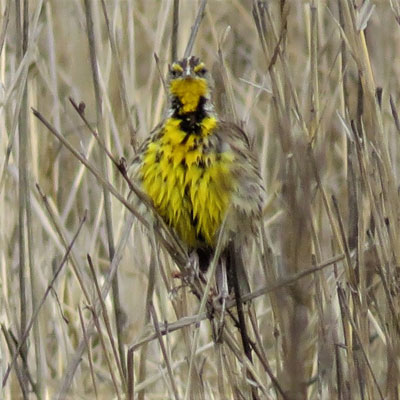
photo: Marisela de Santa Anna
I think that it was Ben Jonson who said, I have studied all the theologies and all the philosophies, but cheerfulness keeps breaking through. Leonard Cohen
The authors and styles of these two books are quite different but the themes are intertwined and timeless. I would imagine all of us including those earliest humans would like to live “an harmonious life.” Similarly and especially today resisting “the attention economy” has been the goal of many an author, philosopher, and even a few economists—Camus (“man is the only creature who refuses to be what he is.”), Voltaire (“il faut cultiver notre jardin”), and E. F. Schumacher (“Any intelligent fool can make things bigger, more complex, and more violent. It takes a touch of genius—and a lot of courage to move in the opposite direction.”). Those are just a few that come to mind. Odell names several more in her book.
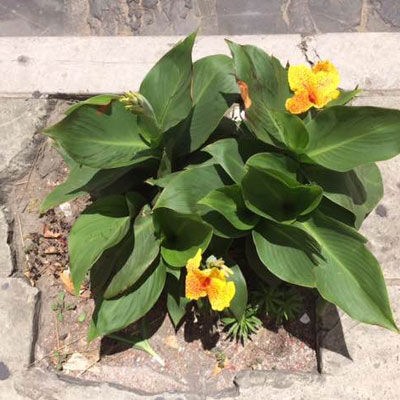
Plant growing out of sidewalk, Oaxaca, Mexico
When we pry open the cracks in the concrete, we stand to encounter life itself—nothing less and nothing more, as if there could be more. Jenny Odell, How To Do Nothing: Resisting the Attention Economy
To uncover your personal power and the
Purpose of your soul, go to a quiet place where
You can be fearless and hopeless for a timeless
Time, and wait for nothing to happen.
Peter Wells, Notes From The West Pole
A little googling led me to a wonderful local resource, The Mendocino Resource Conservation District, and to a recent blog by Marisela de Santa Anna where she expressed her delight at encountering a winter flock of the Western Meadowlark.
Perhaps my favorite part about this captivating bird is its exceptional song which is a watery flutelike call. This is the reason it has been called a lark! During the late summer when these birds sing, their song fills me with nostalgia from my childhood, reminding me of the long hot days of summer in the pastures around where I lived. Marisela de Santa Ana
[The Meadowlark pictures in this post were photographed by Ms. Santa Ana who graciously granted permission for their use.]
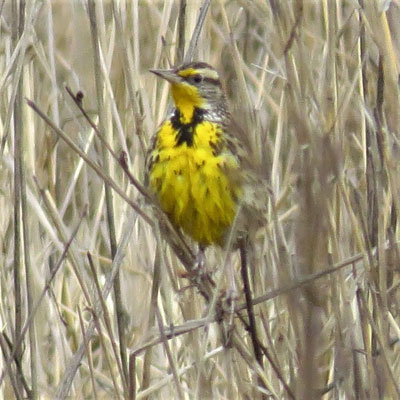
photo: Marisela de Santa Anna
Jenny Odell acknowledges an obvious criticism to the countercultural stance she (and Peter Wells) take— that being privilege.
Of course, there’s an obvious critique of all of this, and that’s that it comes from a place of privilege. I can go to the Rose Garden [Morcom Amphitheatre of Roses in Oakland, California] stare into trees, and sit on hills all the time because I have a teaching job that only requires me to be on campus two days a week, not to mention a whole set of other privileges. Odell
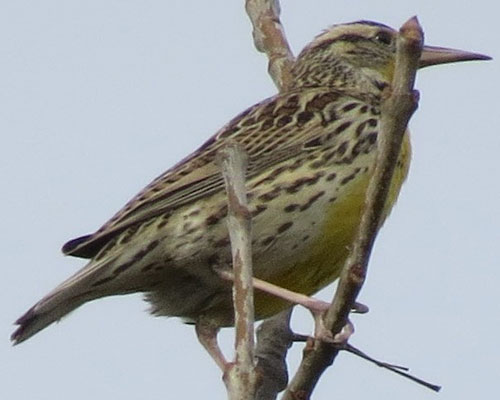
photo: Marisela de Santa Anna
Yes, I too fall into that privileged category. I wrote about my decision to “drop out” to the wild Mendocino coast. After the unexpected loss of my father, my sister and my brother over just a couple of years, I ended up with an inheritance that allowed me to buy the restaurant that is now a large part of Think in the Morning blog. [An inheritance can also have a downside as I discuss HERE.]
Henry David Thoreau is an example of the type of “refusenik” Odell writes about. But he was clearly the beneficiary of privilege.
Thoreau’s mother “famously, did his laundry during his two years of camping on Ralph Waldo Emerson’s property at Walden Pond, is an inadvertent exemplar of the difficulty of setting oneself apart from society. He is also a reminder that living a life of enriching separatism is more attainable for those with certain preëxisting advantages.”
Thoreau also had difficulty with his Civil Disobedience. When he refused to pay the poll tax on the grounds that the proceeds would be used for the Mexican-American War (which they were not), someone paid the tax for him. Bartleby the Scrivener, another character Odell uses to exemplify how to do nothing (“I prefer not to”), dies in jail for his disobedience. Privilege clearly matters.
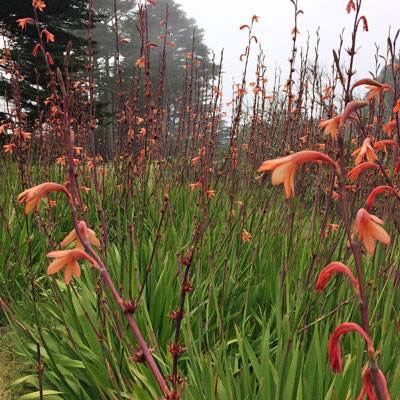
Watsonia, Mendocino Coast
Odell answers the criticism with a long and not entirely satisfactory response.
It’s very possible to understand the practice of doing nothing solely as a self-indulgent luxury, the equivalent of taking a mental health day, if you’re lucky enough to work at a place that has those. But here I come back to Deleuze’s “right to say nothing,” and just because this right is denied to many people doesn’t make it any less of a right or any less important. Odell
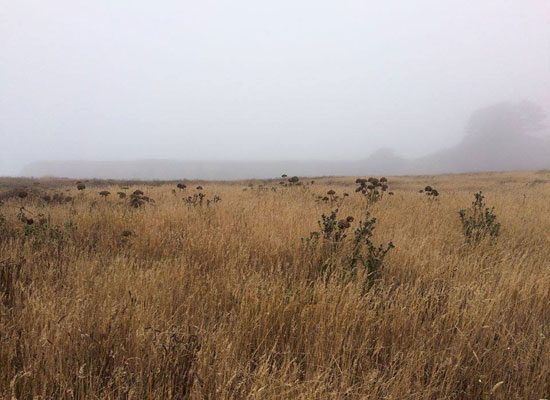
Buckwheat, Mendocino Headlands
True, but that doesn’t quite get to the point that many, most in fact, don’t have the time or resources to indulge in how to do nothing. Still, there is something very appealing in her anti-productivity, anti-capitalist argument that appeals even to some who have less time and resources. She comes up with an interesting concept, the opposite of Manifest Destiny, that she calls “manifest dismantling.”
What’s the opposite of Manifest Destiny? I think it would be something like the Angel of History. It’s a concept I call manifest dismantling. I imagine another painting, one where Manifest Destiny is trailed not by trains and ships but by manifest dismantling, a dark-robed woman who is busy undoing all of the damage wrought by Manifest Destiny, cleaning up her mess. Odell
And, she provides this encouragement.
By the same token, there are many different places where manifest dismantling can begin to work. Wherever we are, and whatever privileges we may or may not enjoy, there is probably some thread we can afford to be pulling on. Sometimes boycotting the attention economy by withholding attention is the only action we can afford to take. Other times, we can actively look for ways to impact things like the addictive design of technology, but also environmental politics, labor rights, women’s rights, indigenous rights, anti-racism initiatives, measures for parks and open spaces, and habitat restoration—understanding that pain comes not from one part of the body but from systemic imbalance. As in any ecology, the fruits of our efforts within any of these fields may well reach beyond to the others. Odell
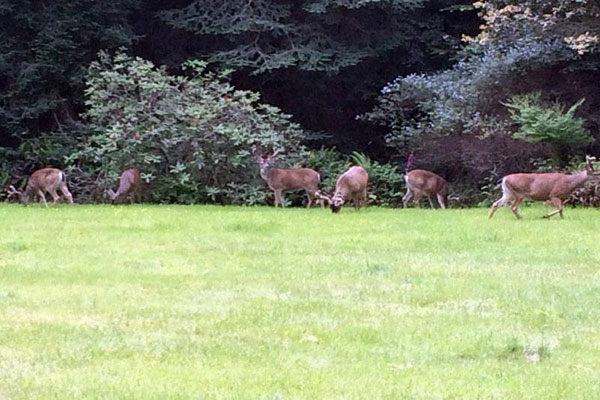
Deer, Little River, California
I found it interesting that Wells and Odell had opposite views of the labyrinth in spite of their similar themes. Wells writes in Notes From The West Pole:
Let’s call this culture with its adversarial rule of law and its absolute authority over the person, with all of its great inventions and its printed money, let’s call this way of life: the labyrinth.
The labyrinth includes all that we covet and, a all that we disdain tragic-comic carnival of clowns and monsters, lovers and haters, and winners and losers. In the labyrinth the warrior belief system is in power with rewards and punishments, friends and enemies, persons of power and wealth, and persons in jail waiting to be executed. The labyrinth is a maze of opposites where the challenge to fight the battle is thrust upon us in order to succeed, in order to survive. Peter Wells
And, of course, he wants us to escape from this hell on earth that we have created for ourselves.
The way out is connected to the way in. The way you went in is the way out. By retracing your steps and unraveling the knots [compare Odell’s “there is probably some thread we can afford to pull on”] you’ve tied within your mind, by releasing your self from judgment and the confusion of hopes and fears that you were required to learn, you can find your own way out from the labyrinth. The labyrinth is the creation of your mind and does not exist without your thought. Peter Wells
For Jenny Odell the labyrinth is a tool used to slow people down and force their attention. It is akin to “deep listening” or “careful reading” (think of professor Amy Hungerford’s Yale lectures) She discovered this idea while bird watching or as she prefers to call it “bird noticing.”
Far from your typical flat square garden with simple rows of roses, it sits into a hill, with an endlessly branching system of paths and stairways through and around the roses, trellises, and oak trees. I’ve observed that everyone moves very slowly, and yes, people do quite literally stop and smell the roses. There are probably a hundred possible ways to wind your way through the garden, and just as many places to sit. Architecturally, the Rose Garden wants you to stay awhile.
You can see this effect at work in the circular labyrinths that are designed for nothing other than contemplative walking. Labyrinths function similarly to how they appear, enabling a sort of dense infolding of attention; through two-dimensional design alone, they make it possible not to walk straight through a space, nor to stand still, but something very well in between. I find myself gravitating toward these kinds of spaces—libraries, small museums, gardens, columbaria—because of the way they unfold secret and multifarious perspectives even within a fairly small area. Odell
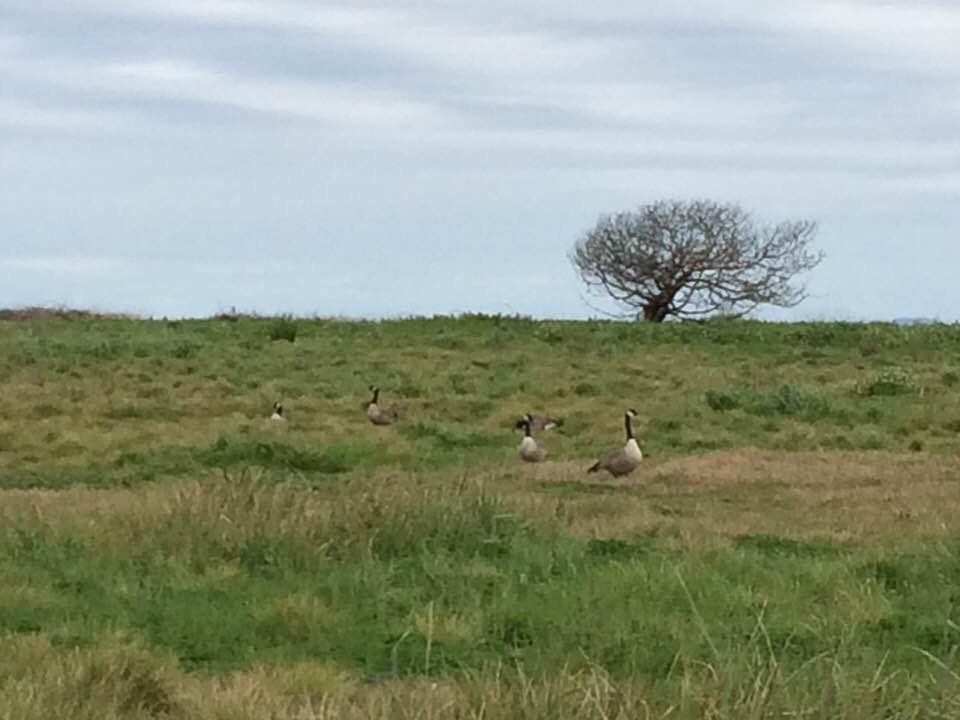
Canadian Geese, Mendocino Headlands
The labyrinth helps us refocus in an otherwise busy world. And, one of her points is that by refocusing we take back control of our lives by choosing which information we will look at and how we will process it (unlike the information we receive on social media). The final result echoes Wells who says: “the labyrinth is the creation of your mind and does not exist without your thought.”
Bird-watching is the opposite of looking something up online. You can’t really look for birds; you can’t make a bird come out and identify itself to you. The most you can do is walk quietly and wait until you hear something, and then stand motionless under a tree, using your animal senses to figure out where and what it is.
THERE’S SOMETHING IMPORTANT that the moment of stopping to listen has in common with the labyrinthine quality of attention-holding architecture: in their own ways, each enacts some kind of interruption, a removal from the sphere of familiarity. Every time I see or hear an unusual bird, time stops, and later I wonder where I was, just as wandering some unexpected secret passageway can feel like dropping out of linear time. Even if brief or momentary, these places and moments are retreats, and like longer retreats, they affect the way we see everyday life when we do come back to it. Odell
All of this occurred to me while listening to a Meadowlark sing on one Mendocino morning—this “train of association”—and much more. I thought of the lovely short story about love and sacrifice by Oscar Wilde (The Nightingale and the Rose). I thought about The Swan and the Sculptor by Mitchell Zucker. And, I thought about this lovely poem by Mary Oliver.
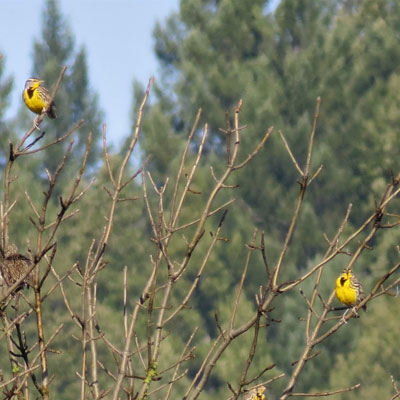
photo: Marisela de Santa Anna
While I Am Writing a Poem to Celebrate Summer, the Meadowlark Begins to Sing
Mary Oliver
Sixty-seven years, oh Lord, to look at the clouds,
the trees in deep, moist summer,
daisies and morning glories
opening every morning
their small, ecstatic faces—
Or maybe I should just say
how I wish I had a voice
like the meadowlark’s,
sweet, clear, and reliably
slurring all day long
from the fencepost, or the long grass
where it lives
in a tiny but adequate grass hut
beside the mullein and the everlasting,
the faint-pink roses
that have never been improved, but come to bud
then open like little soft sighs
under the meadowlark’s whistle, its breath-praise,
its thrill-song, its anthem, its thanks, its
alleluia. Alleluia, oh Lord.
It’s odd how the mind works. In some sense I find it reassuring if baffling. One Mendocino morning I’ll have to figure that out.

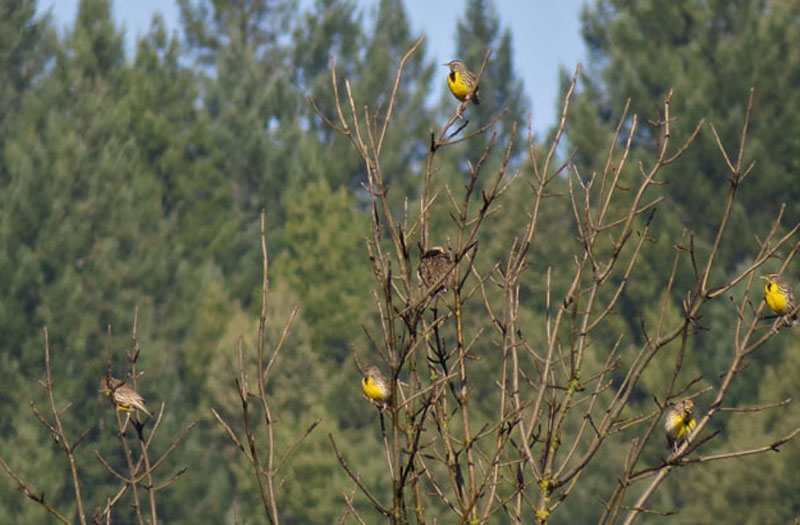
When I’m looking for spiritual inspiration, I turn to Mr. Nature Boy himself, Werner Herzog:
“The trees are in misery, the birds are in misery. I don’t think they sing, they just shriek in pain. But there is some sort of harmony; the harmony of overwhelming, collective murder.”
“In the face of the obscene, explicit malice of the jungle, which lacks only dinosaurs as punctuation, I feel like a half-finished, poorly expressed sentence in a cheap novel.”
“What would an ocean be without monsters lurking in the dark? It would be like sleep without dreams.”
Thank you David for including my work in your amazing piece.
“Think in the Morning” is always fun and always so well written and I love the literary quotes floating through your pages.